小学六年级英语下册知识点整理
最新人教版六年级英语下册各单元知识点总结归纳
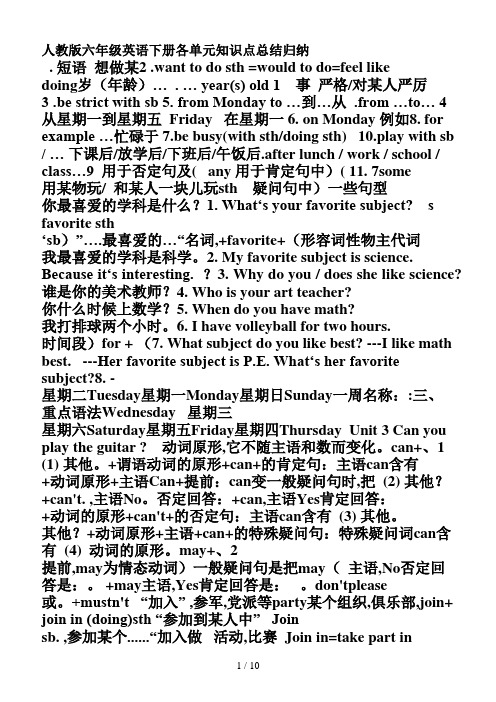
人教版六年级英语下册各单元知识点总结归纳. 短语想做某2 .want to do sth =would to do=feel likedoing岁(年龄)… . … year(s) old 1 事严格/对某人严厉3 .be strict with sb 5. from Monday to ...到...从 .from ...to (4)从星期一到星期五 Friday 在星期一 6. on Monday 例如8. for example …忙碌于 7.be busy(with sth/doing sth) 10.play with sb / … 下课后/放学后/下班后/午饭后.after lunch / work / school / class…9 用于否定句及( any 用于肯定句中)( 11. 7some用某物玩/ 和某人一块儿玩sth 疑问句中)一些句型你最喜爱的学科是什么?1. What‘s your favorite subject? s favorite sth‘sb)”….最喜爱的…“名词,+favorite+(形容词性物主代词我最喜爱的学科是科学。
2. My favorite subject is science. Because it‘s interesting. ?3. Why do you / does she like science? 谁是你的美术教师?4. Who is your art teacher?你什么时候上数学?5. When do you have math?我打排球两个小时。
6. I have volleyball for two hours.时间段)for + (7. What subject do you like best? ---I like math best. ---Her favorite subject is P.E. What‘s her favorite subject?8. -星期二Tuesday星期一Monday星期日Sunday一周名称::三、重点语法Wednesday 星期三星期六Saturday星期五Friday星期四Thursday Unit 3 Can you play the guitar ? 动词原形,它不随主语和数而变化。
六年级英语下册各单元知识点总结梳理
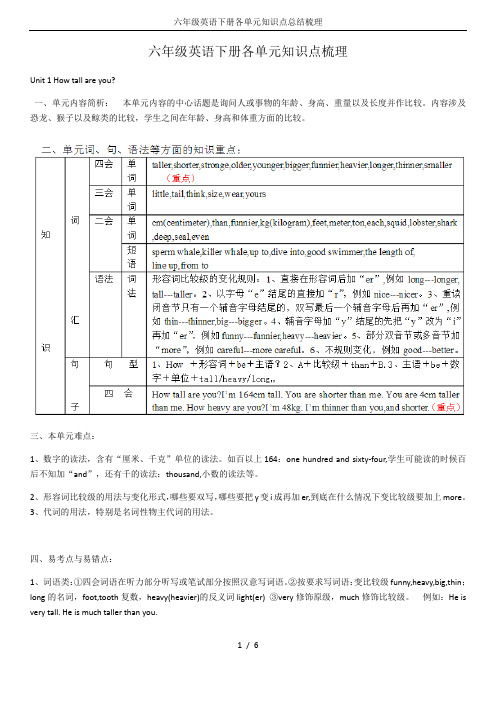
六年级英语下册各单元知识点梳理Unit 1 How tall are you?一、单元内容简析:本单元内容的中心话题是询问人或事物的年龄、身高、重量以及长度并作比较。
内容涉及恐龙、猴子以及鲸类的比较,学生之间在年龄、身高和体重方面的比较。
三、本单元难点:1、数字的读法,含有“厘米、千克”单位的读法。
如百以上164:one hundred and sixty-four,学生可能读的时候百后不知加“and”,还有千的读法:thousand,小数的读法等。
2、形容词比较级的用法与变化形式,哪些要双写,哪些要把y变i成再加er,到底在什么情况下变比较级要加上more。
3、代词的用法,特别是名词性物主代词的用法。
四、易考点与易错点:1、词语类:①四会词语在听力部分听写或笔试部分按照汉意写词语。
②按要求写词语:变比较级funny,heavy,big,thin;long的名词,foot,tooth复数,heavy(heavier)的反义词light(er) ③very修饰原级,much修饰比较级。
例如:He is very tall. He is much taller than you.2、语法、句型类:①How引导的不同特殊疑问句:How be sb.?(问某人状况),How tall/heavy/old be sb./sth?(询问身高、体重、年龄)How long/big/large be---?(问多长、多大)How many/much(问数量、价格)。
②比较级的运用,一定要是相同内容或类别才可以进行比较,这是学生最易出错和混淆娥地方。
例如:Mike’s legs are longer than(John),如果学生翻译会直接填写John,但是一分析就不难发现应该和John的腿作比较的,所以应该是John’s。
再比如My hair is longer than (she).如果不仔细分析大多数学生都会错填成:she,her,但是填hers才是正确的。
人教PEP版英语六年级下册Unit 1-4知识点总结(期末复习)
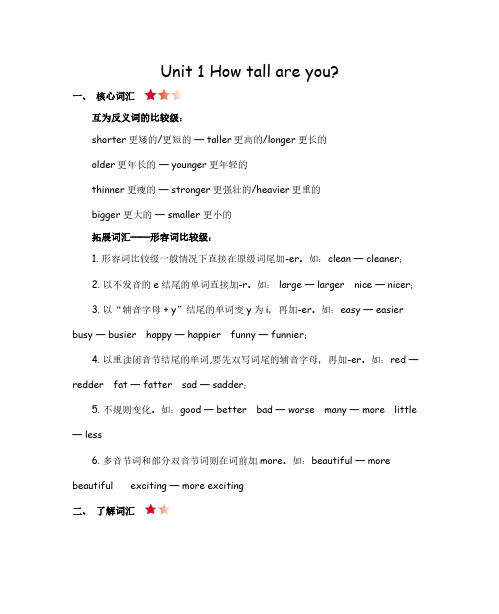
Unit1How tall are you?一、核心词汇互为反义词的比较级:shorter更矮的/更短的—taller更高的/longer更长的older更年长的—younger更年轻的thinner更瘦的—stronger更强壮的/heavier更重的bigger更大的—smaller更小的拓展词汇——形容词比较级:1.形容词比较级一般情况下直接在原级词尾加-er。
如:clean—cleaner;2.以不发音的e结尾的单词直接加-r。
如:large—larger nice—nicer;3.以“辅音字母+y”结尾的单词变y为i,再加-er。
如:easy—easier busy—busier happy—happier funny—funnier;4.以重读闭音节结尾的单词,要先双写词尾的辅音字母,再加-er。
如:red—redder fat—fatter sad—sadder;5.不规则变化。
如:good—better bad—worse many—more little —less6.多音节词和部分双音节词则在词前加more。
如:beautiful—more beautiful exciting—more exciting二、了解词汇dinosaur恐龙hall大厅metre米(美式英语:meter)than比both两个都kilogram千克;公斤countryside乡村lower(low的比较级)更低地shadow阴影;影子smarter(smart的比较级)更聪明的become开始变得;变成三、核心句型1.—How tall are you?你有多高?—I’m1.64metres.我身高1.64米。
2.—What size are your shoes,Mike?迈克,你穿多大号的鞋?—Size7.7号。
3.—How heavy are you?你体重多少?—I’m48kilograms.我体重48公斤。
六年级下册英语知识点复习总结

六年级下册英语知识点复习总结六年级下册英语知识点复习总结在平平淡淡的学习中,大家最不陌生的就是知识点吧!知识点也可以理解为考试时会涉及到的知识,也就是大纲的分支。
哪些知识点能够真正帮助到我们呢?以下是店铺为大家整理的六年级下册英语知识点复习总结,欢迎阅读,希望大家能够喜欢。
小学六年级下册英语知识点:第三单元四会单词:watch—watched 看wash—washed 洗clean—cleaned打扫play—played玩 visit—visited 看望do—did last weekend上一个周末 go—went去go to a park—went to a park 去公园go swimming—went swimming去游泳go fishing—went fishing去钓鱼read—read 读go hiking—went hiking 去郊游四会句型:What did you do last weekend? 你上个周末干什么了?I played football. 我踢足球了。
Did you read books? 你读书了吗?Yes, I did.是的,我读了。
No, I didn’t. 不,我没有。
应该掌握的知识点:1、关于一般过去时一般过去时态:表示过去某一时间所发生的动作或存在的状态。
谓语动词要用一般过去式。
经常与yesterday(昨天), last week(上周), last month(上个月), last year(去年), two months ago(两个月前), the day before yesterday(前天),in 1990 (在1990年), in those days (在那些日子里)等表示过去的时间状语连用。
如: I was born in 1990. (我出生在1990年)。
When did you go to the park? (你是什么时候去的公园)。
六年级下册英语知识点梳理

六年级下册英语知识点梳理云林小学李春第一块去年六年级毕业试卷分析第二块六年级下册单元知识点第三块小学阶段考试容易出现的小作文第四块小学阶段四种时态的认识第五块3--6年级常用表达法和单元词汇的整理分享第一块去年六年级毕业试卷分析第一单元Howtallareyou?一、单元重点词汇younger(young的比较级)older(old的比较级)taller(tall的比较级)shorter(short的比较级)longer(long的比较级)bigger(big的比较级)thinner(thin的比较级)smaller(small的比较级)heavier(heavy的比较级)stronger(strong的比较级)(要注意几个特殊变化的单词二、重点句型1、问年龄,身高,体重、鞋码等Howoldareyou--I’m______kg.Howtallareyou--I’m______cmtall.Howheavyareyou--I’m_______(yearsold).Whatsizeareyourshoes?--Iwearsize37.2、比较级句型的掌握…be(amisare)+比较级than…Iam4cmtallerthanyourbrother.我比你弟弟高4cm. Iamtallerandstrongerthanyourbrother.我比你的弟弟更高更壮。
3、所有格句型的掌握Mike’sfishislongerthanSarah’s.第二单元Lastweekend一、重点单词clean打扫--cleaned(clean的过去式)打扫stay停留--stayed(stay的过去式)停留wash洗——washed洗watch看——watched看have患病——had患病sleep睡觉——slept睡觉read读——read读see看见——saw看见last上一个的yesterday昨天before在之前二、短语cleanmyroom打扫我的房间washmyclothes洗衣服stayathome呆在家里watchTV看电视goboating划船readabook读书seeafilm看电影haveacold 感冒sleep睡觉(过去式slept)climbamountain爬山cookeddinner做饭cooknoodles面条三、句子1.Howwasyourweekend你周末过得怎么样?Itwasgood/fine/ok,thankyou.很好,谢谢!2.Whatdidyoudolastweekend你上个周末干了什么?Istayedathomewithyourgrandma.我和你奶奶呆在家里.(with和谁)3.Didyoudoanythingelse你还做了其他什么事吗?Icleanedmyroomandwashedmyclothes.是的,我扫了房间,还洗了衣服。
六年级下册第二单元英语知识点

六年级下册第二单元英语知识点一、重点单词。
1. 形容词。
- clean(干净的) - dirty(脏的)- healthy(健康的) - unhealthy(不健康的)- strong(强壮的) - weak(虚弱的)- happy(高兴的) - sad(悲伤的)2. 与生活习惯相关的名词。
- habit(习惯)- exercise(锻炼;练习)- sleep(睡觉)- junk food(垃圾食品)- vegetable(蔬菜)- fruit(水果)3. 频度副词。
- always(总是)- usually(通常)- often(经常)- sometimes(有时)- never(从不)二、重点短语。
1. 与健康生活方式相关。
- do exercise(做锻炼)- eat vegetables(吃蔬菜)- eat fruit(吃水果)- drink milk(喝牛奶)- go to bed early(早睡)- get up early(早起)- keep clean(保持干净)- wash hands(洗手)2. 表示频率的短语。
- once a day(一天一次)- twice a week(一周两次)- three times a month(一个月三次)三、重点句型。
1. 描述健康习惯。
- I often do exercise. It makes me strong.(我经常做锻炼。
它让我强壮。
)- She always eats vegetables. They are good for her health.(她总是吃蔬菜。
它们对她的健康有好处。
)2. 描述不健康习惯及影响。
- He sometimes eats junk food. It's bad for his body.(他有时吃垃圾食品。
这对他的身体有害。
)- They never go to bed early. So they are often tired in class.(他们从不早睡。
(完整版)六年级下册英语知识点总结

(完整版)六年级下册英语知识点总结六年级下册英语知识点总结第一单元(Unit1 How tall are you?)单词:tall—taller更高的short—shorter 更矮的strong—strong更强壮的old—older年龄更大的young—younger 更年轻的big—bigger更大的heavy—heavier 更重的long—longer 更长的thin—thinne更瘦的small—smaller 更小的dinosaur恐龙hall大厅metre,meter 米than比both 两个都kilogram千克,公斤countryside乡村low—lower更低的shadow阴影,影子smart—smarter更聪明的become开始变得,变成句子:1、That's the tallest dinosaur in this hall.那是这个厅里最高的恐龙。
2、You’re older than me. 你比我大。
3、How tall are you ?你有多高?I’m 1.65 metres.我身高1.65米。
4、What size are your shoes ?你穿多大号的鞋?5、My shoes are size 37. 我穿37号的鞋。
6 、Your feet are bigger than mine .你的脚比我的大。
7、How heavy are you ?你有多重?I’m 48 kilograms .我体重48公斤。
8、It’s taller than both of us togethe r .它比我们俩加在一起还高。
应该掌握的知识点:1、形容词变为比较级的变化规则:(1)一般情况下,在形容词的词尾直接加er。
如: tall—taller short—shorter.(2)以字母e结尾的形容词,在词尾直接加r,如:nice—nicer. late—later(3)以重读闭音节结尾,且结尾只有一个辅音字母的词,先双写这个辅音字母,再加er.如:big—bigger thin—thinner fat—fatter(4)以辅音字母加y结尾的双音节形容词,先变y为i , 再加er。
人教版小学六年级英语下册期末复习各单元知识点汇集
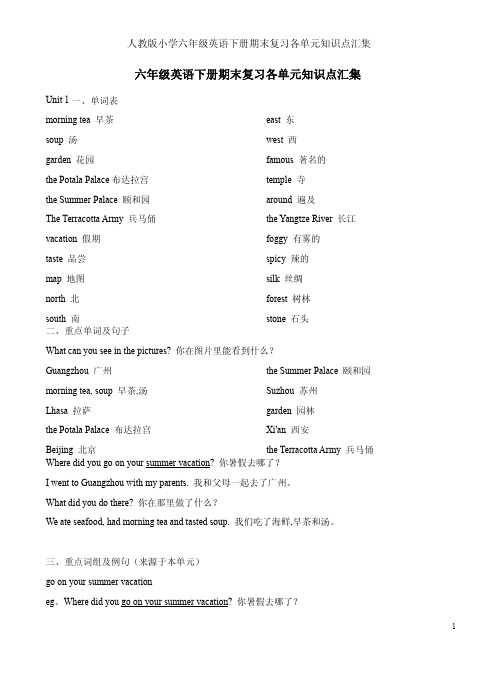
六年级英语下册期末复习各单元知识点汇集Unit1一、单词表morning tea早茶soup汤garden花园the Potala Palace布达拉宫the Summer Palace颐和园The Terracotta Army兵马俑vacation假期taste品尝map地图north北south南east东west西famous著名的temple寺around遍及the Yangtze River长江foggy有雾的spicy辣的silk丝绸forest树林stone石头二、重点单词及句子What can you see in the pictures?你在图片里能看到什么?Guangzhou广州morning tea,soup早茶,汤Lhasa拉萨the Potala Palace布达拉宫Beijing北京the Summer Palace颐和园Suzhou苏州garden园林Xi'an西安the Terracotta Army兵马俑Where did you go on your summer vacation?你暑假去哪了?I went to Guangzhou with my parents.我和父母一起去了广州。
What did you do there?你在那里做了什么?We ate seafood,had morning tea and tasted soup.我们吃了海鲜,早茶和汤。
三、重点词组及例句(来源于本单元)go on your summer vacationeg、Where did you go on your summer vacation?你暑假去哪了?eat seafood海鲜have morning tea早茶have tasted soupeg、We ate seafood,had morning tea and tasted soup.我们吃了海鲜,早茶和汤。
六年级下英语知识点总结(优秀)

六年级下英语知识点总结(优秀)六年级下册英语知识点复习总结篇一①playbadminton打羽毛球②alwaysdoyourhomework总是做家庭作业③drythedishesaftersupper晚饭后擦干盘子④atthesportsstore在运动品专卖店⑤makelunch做午饭⑥lastweek上周⑦before/afterbreakfast⑧onceayear一年一次⑨wakeup起床动词原形及过去式buy----bought(买)teach----taught(教)think----thought(想)win-----won(赢)do----did(做)lose----lost(丢失)throw----threw(扔)swim----swam(游泳)have----had(有)lie-------lay(躺)say------said(说)forget-----forgot(忘记)begin------bagin(开始)bring-----brought(带来)eat----ate(吃)go-----went(去)isam-----wasare-----were六年级英语知识点大总结篇二六年级英语知识点大总结Unit1 How can I get there?key words(重点单词)museum 博物馆 postoffice 邮局bookstore 书店 cinema 电影院hospital 医院 restaurant 餐馆crossing 十字路口 turn left/ right 左转go straight 笔直走 map 地图next to 与。
相邻 near在。
附近key sentence patterns (重点句型)1. Where is the cinema? 电影院在哪?2. It’s next to the bookstore.它紧邻书店。
3. How can I get there? 我怎样到那儿?4. Turn left at the bookstore. 在书店左转。
2020新人教版(PEP)小学英语六年级下册各单元知识点总结
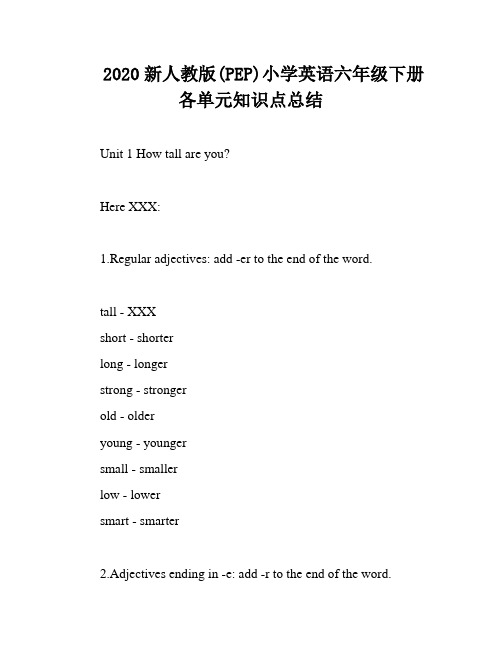
2020新人教版(PEP)小学英语六年级下册各单元知识点总结Unit 1 How tall are you?Here XXX:1.Regular adjectives: add -er to the end of the word.tall - XXXshort - shorterlong - longerstrong - strongerold - olderyoung - youngersmall - smallerlow - lowersmart - smarter2.Adjectives ending in -e: add -r to the end of the word.large - largerlate - latersimple - simplersafe - safer3.Adjectives XXX: double the final consonant and add -er.big - biggerXXX - XXXfat - fattersad - sadderhot - hotterwet - wetter4.Adjectives ending in -y: change the -y to -i and add -er.happy - happierheavy - XXXXXX - funnierangry - angrierXXX - XXXwindy - windierbusy - busierearly - earlierXXX:dinosaur。
hall。
than。
both。
meter。
kilogram。
size。
feet。
wear。
countryside。
shadow。
e.Here XXX:1.Asking about age。
height。
weight。
etc.How old are you?How tall are you?How heavy are you?I am (age) years old。
小学英语人教精通版六年级下册重点归纳

小学英语人教精通版六年级下册重点归纳第一单元Unit1 I went to Sanya for my holidays.重点单词:Sun 太阳moon月亮star星星Learn 学习;学到word 单词;词blackboard黑板say 说subject学科but 但是yesterday昨天why 为什么use用重点短语:1.by plane 乘飞机2.at night 在晚上3.at home 在家里4.a lot of 很多5.go to the beach 去沙滩6.do tasks 做任务7.act in drama 表演戏剧8.stay at home 待在家里9.have a party 聚会10.enjoy Spring Festive 过春节11.listen to music 听音乐12.speak English 讲英语13.read English 读英语14.write E n glish 写英语15.talk in English n用英语交谈16.play in English 用英语玩游戏17.enjoy sunbathing享受日光浴18.have an English party举办英语聚会19.enjoy the moon and stars看月亮和醒醒20.learn from each other 互相学习。
重点句型:1. We have learned a lot of English words我. 们学了很多英语单词。
2. We learned from each other我. 们互相学习。
2.What did you do for your holidays?你假期做了什么?3.I went to Sanya.我去了三亚。
4.We are very interested in English我. 们对英语很感兴趣。
5.How did you learn English?你(们)是怎么学英语的?6.We learned English by doing things我. 们通过做事情来学英语。
六年级英语下册知识点总结

六年级下册知识点总结Unit 1 How Tall Are You?重点单词:Taller, shorter, stronger, older, younger, bigger, heavier, longer, thinner, smaller, funnier, meter, squid, lobster, shark, deep, seal, sperm whale, killer whale 重点句型:1-How tall are you?-I'm 1.60 meters tall/ I'm 160 cm.2-How heavy are you?-I'm 48 kg,-How long are your legs?-76 cm.4 -How big are your feet?-I wear size 17.5 -Who is taller than you?-Tom is taller than me.注:形容词比较级的变化规律:Unit2 What§The Matter,Mike?单词:重点Havea fever, hurt, have a cold, have a toothache, have a headache, have a sore throat, matter, sore, nose, tired, excited, angry, happy, bored, sad, medicine, a little, laugh at重点句型:1 -What's the matter with them?-The robot is tired, the stray man has a headache.-Fine. How are you?-I have a headache / fever / cold / toothache / sore throat.或have the flu.3 -What's the matter, mike?-I feel sick. I have a fever./ My throat is sore, my nose is hurt.4-How does Lisa feel?-She is tired/ sad/happy/excited.5-How are you, Liu Yun? You look sad.-I failed the math test.6-How do you / them feel? /How does he/she feel?-They feel happy./He/She feels happy.Unit 3 Last Weekend重点单词:Watch, wash, clean, play, visit, do, last, weekend, go, to, park, go to swimming, go hiking, go fishing, tongue twister, yesterday, return 重点句型:1-What did you do last weekend/yesterday?-I watched TV / washed the clothes/cleaned the room/played the football/visited grandparents/ played football/went to a park/went swimming/read a book/went fishing/went hiking/-Did you do homework yesterday?-Yes, I did./ No, I didn't.2-What did you do last weekend?-I V-ed……注:动词过去时的变化形式:1、一般情况下,动词词尾加-ed ,如:work ---worked play-played wanted--wanted act --- acted2、以不发音的-e结尾动词,动词词尾加-d,如:live-lived move——moved taste-tasted hope -hoped3、以辅音字母+y结尾的动词,把-y变为-i再加-ed,如:study-studied copy-copied cry-cried carry-carried4、以一个辅音字母结尾的重读闭音节动词,双写词尾辅音字母,再加-ed,如:stop —stopped5、不规则动词的过去式变化规律性不强,须多加记忆。
牛津小学英语六年级下册知识点总结(词组+句型)
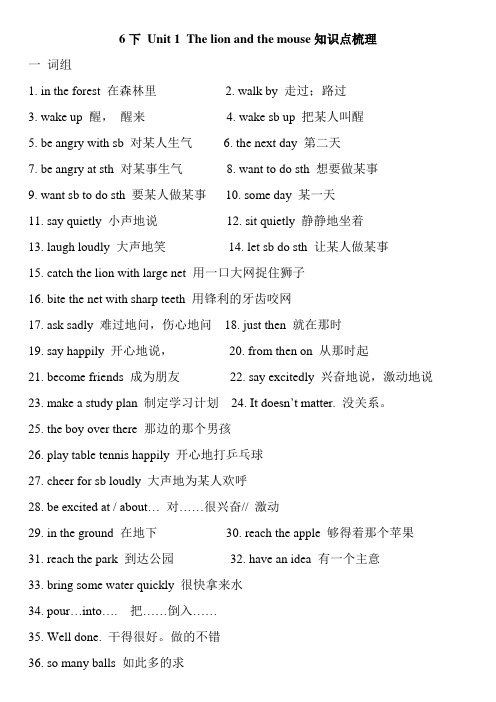
6下Unit 1 The lion and the mouse知识点梳理一词组1. in the forest 在森林里2. walk by 走过;路过3. wake up 醒,醒来4. wake sb up 把某人叫醒5. be angry with sb 对某人生气6. the next day 第二天7. be angry at sth 对某事生气8. want to do sth 想要做某事9. want sb to do sth 要某人做某事10. some day 某一天11. say quietly 小声地说 12. sit quietly 静静地坐着13. laugh loudly 大声地笑14. let sb do sth 让某人做某事15. catch the lion with large net 用一口大网捉住狮子16. bite the net with sharp teeth 用锋利的牙齿咬网17. ask sadly 难过地问,伤心地问18. just then 就在那时19. say happily 开心地说,20. from then on 从那时起21. become friends 成为朋友22. say excitedly 兴奋地说,激动地说23. make a study plan 制定学习计划24. It doesn’t matter. 没关系。
25. the boy over there 那边的那个男孩26. play table tennis happily 开心地打乒乓球27. cheer for sb loudly 大声地为某人欢呼28. be excited at / about… 对……很兴奋// 激动29. in the ground 在地下 30. reach the apple 够得着那个苹果31. reach the park 到达公园32. have an idea 有一个主意33. bring some water quickly 很快拿来水34. pour…into….把……倒入……35. Well done. 干得很好。
PEP小学英语六年级上下全册知识点总结
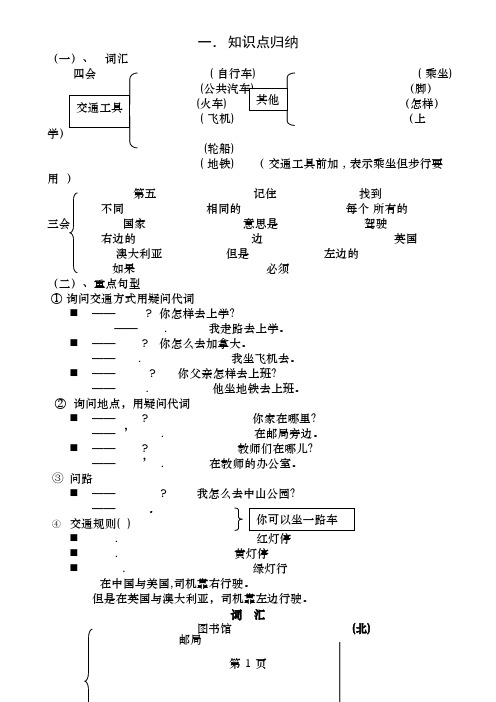
一. 知识点归纳(一)、 词汇乘坐) (脚)火车(怎样) 飞机(上轮船) ( 地铁) ( 交通工具前加 , 表示乘坐但步行要用 )第五 记住 找到不同 相同的 每个 所有的三会 国家 意思是 驾驶右边的 边 英国 澳大利亚 但是 左边的 如果 必须(二)、重点句型① 询问交通方式用疑问代词⏹ —— ? 你怎样去上学?—— . 我走路去上学。
⏹ —— ? 你怎么去加拿大。
—— . 我坐飞机去。
⏹ —— ? 你父亲怎样去上班?—— . 他坐地铁去上班。
② 询问地点,用疑问代词⏹ —— ? 你家在哪里?—— ’ . 在邮局旁边。
⏹ —— ? 教师们在哪儿?—— ’ . 在教师的办公室。
③ 问路⏹ —— ? 我怎么去中山公园?—— .④ 交通规则( )⏹ ⏹ . 黄灯停 ⏹ . 绿灯行在中国与美国,司机靠右行驶。
但是在英国与澳大利亚,司机靠左边行驶。
词 汇图书馆 (北) 邮局医院: 电影院(地点) 书店 (东) (西)科学博物馆银行学校(南)超市鞋店在哪里请与…相邻右边,正确的左边成直线地然后转弯对不起想要双分钟告诉乘坐远放学以后上车下车第十二聚会;晚会开始买句型一、问路. , ? 请问电影院在哪儿?. 在医院的旁边。
. 在学校的前面.在公园的后面’ . 在动物园的附近.. 在书店的左右边.. 在银行的东边.. 离这儿很远.. , 请问这附近有电影院吗?, . 有.. ? 我该怎样到达医院呢?二、指引路. . 你可乘坐路公交车去那儿.. …在…地方上车下车.. . 向前直走在分钟.. …在…地方向右左转.朝东西南北走…分钟.三 ? 离这儿远吗?一.知识点归纳(一)、词汇四会下周报纸今天上午漫画书今天下午杂志(时间 ) 今天晚上字典今夜明信片明天去旅游主题公园买一些水果宠物店(活动)去看电影(其他)水果摊参观长城鞋店阅读有关植物的杂志商店三会:忙碌的一起地需要其他二、重点句式与句型:本单元中出现的一个重点语法项目是一般将来时:表示将要发生的动作或状态,常与表示将来的时间连用。
六年级下册英语必考知识点
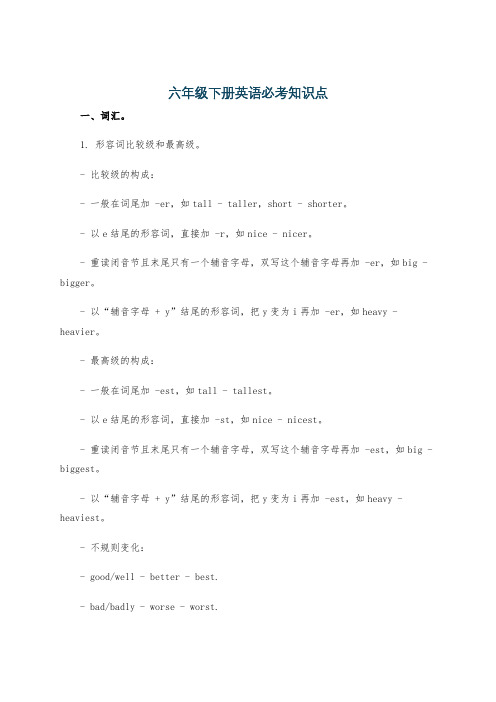
六年级下册英语必考知识点一、词汇。
1. 形容词比较级和最高级。
- 比较级的构成:- 一般在词尾加 -er,如tall - taller,short - shorter。
- 以e结尾的形容词,直接加 -r,如nice - nicer。
- 重读闭音节且末尾只有一个辅音字母,双写这个辅音字母再加 -er,如big - bigger。
- 以“辅音字母 + y”结尾的形容词,把y变为i再加 -er,如heavy - heavier。
- 最高级的构成:- 一般在词尾加 -est,如tall - tallest。
- 以e结尾的形容词,直接加 -st,如nice - nicest。
- 重读闭音节且末尾只有一个辅音字母,双写这个辅音字母再加 -est,如big - biggest。
- 以“辅音字母 + y”结尾的形容词,把y变为i再加 -est,如heavy - heaviest。
- 不规则变化:- good/well - better - best.- bad/badly - worse - worst.- many/much - more - most.- little - less - least.2. 动词的过去式。
- 规则变化:- 一般在词尾加 -ed,如play - played,clean - cleaned。
- 以e结尾的动词,加 -d,如live - lived。
- 重读闭音节且末尾只有一个辅音字母,双写这个辅音字母再加 -ed,如stop - stopped。
- 以“辅音字母 + y”结尾的动词,把y变为i再加 -ed,如study - studied。
- 不规则变化:- go - went.- see - saw.- eat - ate.- have/has - had等。
3. 重点单词。
- 职业类:doctor(医生),teacher(教师),pilot(飞行员),scientist (科学家),artist(艺术家)等。
六年级英语下册Unit5重点词汇、句型、语法知识点整理

六年级英语下册Unit5重点词汇、句型、语法知识点整理Unit 5 重点词汇、句型、语法知识Story time1. Children’s Day 儿童节 on Children’s Day 在儿童节2. this Sunday 本周日, 这个星期日3. The children are going to have a party at Mike’s house. 孩子们将要在迈克的家里举办一个聚会have a party 举行一次聚会 at Mike’s house 在迈克的家里4. Su Hai is going to buy some snacks and drinks. 苏海准备买一些零食和饮料。
buy some snacks and drinks买一些零食和饮料5. Wang Bing is going to bring some fruit from home. 王兵准备从家里带来些水果。
bring some fruit from home 从家里带一些水果来6.Yang Ling is going to bring some toys and play with her friends at the party.杨玲准备带来些玩具,并在聚会上和她的朋友们玩。
bring some toys带一些玩具来 play with her friends和她的朋友们玩at the party 在聚会上7.What is he going to do for the party? 他准备为聚会做什么?8. Sunday morning 周日上午 on Sunday morning 在周日上午onTuesday afternoon 在周二下午 on Thursday evening在周四晚上9.bring their things to Mike’s house 带他们的东西到迈克的家bring...to.... 把……带到……bring some snacks to the party把一些零食带到聚会10. Just then, a clown appears. 就在那时,一个小丑出现了。
六年级下册英语书笔记
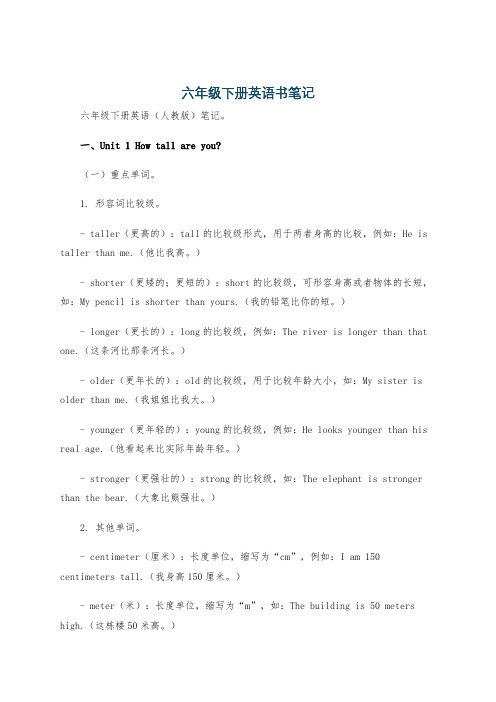
六年级下册英语书笔记六年级下册英语(人教版)笔记。
一、Unit 1 How tall are you?(一)重点单词。
1. 形容词比较级。
- taller(更高的):tall的比较级形式,用于两者身高的比较,例如:He is taller than me.(他比我高。
)- shorter(更矮的;更短的):short的比较级,可形容身高或者物体的长短,如:My pencil is shorter than yours.(我的铅笔比你的短。
)- longer(更长的):long的比较级,例如:The river is longer than that one.(这条河比那条河长。
)- older(更年长的):old的比较级,用于比较年龄大小,如:My sister is older than me.(我姐姐比我大。
)- younger(更年轻的):young的比较级,例如:He looks younger than his real age.(他看起来比实际年龄年轻。
)- stronger(更强壮的):strong的比较级,如:The elephant is stronger than the bear.(大象比熊强壮。
)2. 其他单词。
- centimeter(厘米):长度单位,缩写为“cm”,例如:I am 150 centimeters tall.(我身高150厘米。
)- meter(米):长度单位,缩写为“m”,如:The building is 50 meters high.(这栋楼50米高。
)- kilogram(千克;公斤):重量单位,缩写为“kg”,例如:This bag weighs 5 kilograms.(这个包重5公斤。
)(二)重点句型。
1. 询问身高、长度等。
- How tall are you?(你有多高?)- I'm 1.65 meters.(我身高1.65米。
部编版六年级英语下册必背必考知识点

部编版六年级英语下册必背必考知识点第一单元:动物朋友们1.1 单词1. zoo:动物园2. tiger:老虎3. elephant:大象4. monkey:猴子5. giraffe:长颈鹿6. lion:狮子7. seal:海豹8. panda:熊猫9. parrot:鹦鹉10. wild:野生的1.2 短语1. go to the zoo:去动物园2. a tall animal:一个高大的动物3. the biggest animal:最大的动物4. a small monkey:一个小猴子5. in the tree:在树上1.3 句型1. What's this?:这是什么?2. What's that?:那是什么?3. It's ...:它是...4. Do you like ...?:你喜欢...吗?5. Yes, I do./No, I don't.:是的,我喜欢./不,我不喜欢。
第二单元:我们的身体2.1 单词1. body:身体2. head:头3. eye:眼睛4. ear:耳朵5. nose:鼻子6. mouth:嘴7. arm:手臂8. hand:手9. leg:腿10. foot:脚2.2 短语1. head and shoulders:头和肩膀2. eyes and ears:眼睛和耳朵3. nose and mouth:鼻子和嘴4. arms and legs:手臂和腿2.3 句型1. I have ...:我有...2. He/She has ...:他/她有...3. Do you have ...?:你有...吗?4. Yes, I do./No, I don't.:是的,我有./不,我没有。
第三单元:颜色和形状3.1 单词1. red:红色2. yellow:黄色3. blue:蓝色4. green:绿色5. black:黑色6. white:白色7. purple:紫色8. orange:橙色9. round:圆的10. square:平方的3.2 短语1. red and yellow:红色和黄色2. blue and green:蓝色和绿色3. black and white:黑色和白色4. purple and orange:紫色和橙色3.3 句型1. What color is it?:它是什么颜色?2. It's ...:它是...3. What shape is it?:它是什么形状?4. It's ...:它是...第四单元:食物和饮料4.1 单词1. apple:苹果2. banana:香蕉3. orange:橙子4. grape:葡萄5. watermelon:西瓜6. pear:梨7. rice:米饭8. noodles:面条9. meat:肉10. egg:鸡蛋4.2 短语1. eat fruit:吃水果2. drink milk:喝牛奶3. have a meal:吃一顿饭4.3 句型1. What do you like?:你喜欢什么?2. I like ...:我喜欢...3. What do you want?:你想要什么?4. I want ...:我想要...第五单元:家庭和朋友5.1 单词1. father:父亲2. mother:母亲3. brother:兄弟4. sister:姐妹5. grandfather:祖父6. grandmother:祖母7. friend:朋友5.2 短语1. my family:我的家人2. your family:你的家人3. his family:他的家人4. her family:她的家人5.3 句型1. Who's this?:这是谁?2. Who's that?:那是谁?3. It's ...:它是...4. Is it ...?:它是...吗?以上是部编版六年级英语下册必背必考知识点的详细内容,希望对大家有所帮助。
- 1、下载文档前请自行甄别文档内容的完整性,平台不提供额外的编辑、内容补充、找答案等附加服务。
- 2、"仅部分预览"的文档,不可在线预览部分如存在完整性等问题,可反馈申请退款(可完整预览的文档不适用该条件!)。
- 3、如文档侵犯您的权益,请联系客服反馈,我们会尽快为您处理(人工客服工作时间:9:00-18:30)。
六年级英语下册知识点整理第一单元一、单词young—younger更年轻的old -older更年长的tall- taller更高的short-shorter更矮的long-longer更长的thin-thinner更瘦的heavy-heavier更重的big-bigger更大的small -smaller更小的strong -stronger更强壮的二、句子1.That's the tallest dinosaur in this hall. 那是这个厅里最高的恐龙。
2.You're older than me.你比我大。
3.How tall are you?你有多高?I'm 1.65 meters.我身高1.65米。
4.What size are your shoes?你穿多大号的鞋。
5.My shoes are size37.我穿37号的鞋。
6. Your feet are bigger than mine.你的脚比我的大。
7. How heavy are you?你有多重?8. I'm 48 kilograms.我体重48公斤。
三、语法复习要点形容词的比较级1、形容词比较级在句子中的运用:两个事物或人的比较用比较级,比较级后面一般带有单词than。
than后的人称代词用主格(口语中可用宾格)。
2.形容词加er的规则:⑴一般在词尾加er ;⑵以字母e 结尾,加r ;nice---nicer⑶以一个元音字母和一个辅音字母结尾,应双写末尾的辅音字母,再加er ;big---bigger thin---- thinner⑷以“辅音字母+y”结尾,先把y变i,再加er 。
heavy----heavier3.不规则形容词比较级:good/well-better例句:(1).It's taller than both of us together.它比我俩加起来还高。
(2).Your feet are bigger than mine.你的脚比我的大。
(3).I’m heavier than you.我比你重。
第二单元一、单词clean打扫-- cleaned(clean 的过去式)打扫stay停留-- stayed (stay的过去式)停留wash洗——washed 洗watch看——watched看have患病——had 患病sleep 睡觉——slept睡觉read读——read 读see 看见——saw看见last 上一个的yesterday 昨天before在…之前二、短语clean my room 打扫我的房间wash my clothes 洗衣服stay at home 呆在家里watch TV 看电视go boating 划船read a book 读书see a film 看电影have a cold 感冒sleep 睡觉(过去式slept)climb a mountain 爬山cooked dinner做饭cook noodles 面条三、句子1.How was your weekend?你周末过得怎么样?2.It was good/fine/ok,thank you.很好,谢谢!3.What did you do last weekend?你上个周末干了什么?4.I stayed at home with your grandma.我和你奶奶呆在家里.(with和谁)5. Did you do anything else?你还做了其他什么事吗?6. Yes,I cleaned my room and washed my clothes.是的,我扫了房间,还洗了衣服。
7.I want to buy the new film magazine.我想买期新的电影杂志。
8.Did you see a film?你看电影了吗?No,I didn’t .I had a cold. I stayed at home all weekend and slept.没有,我感冒了。
整个周末都呆在家里睡觉。
(肯定回答Yes,I did.)四、语法知识:一般过去时1.一般过去时表示过去某个时间发生的动作或存在的状态,常和表示过去的时间状语连用。
一般过去时也表示过去经常或反复发生的动作感谢。
2.Be动词在一般过去时中的变化:⑴am 和is在一般过去时中变为was。
(was not=wasn’t)⑵are在一般过去时中变为were。
(were not=weren’t)新课标第一网⑶带有was或were的句子,其否定、疑问的变化和is, am, are一样,即否定句在was或were后加not,一般疑问句把was或were调到句首。
3.句中没有be动词的一般过去时的句子(1) 否定句:didn’t +动词原形,如:Jim didn’t go home yesterday.(2)一般疑问句:在句首加did,句子中的动词过去式变回原形。
如:Did Jim go home yesterday?(3)特殊疑问句:疑问词+did+主语+动词原形?如:What did you do yesterday? I read a book.第三单元一、单词(用的过去式)go 去——went去fish 钓鱼ride骑--rode 骑hurt受伤--hurt 受伤eat 吃--ate 吃take—took buy买-- boughtgo camping 野营--went camping 野营go fishing 去钓鱼--went fishing 去钓鱼take pictures照相-- took pictures 照相buy gifts 买礼物-- bought gifts 买礼物二、短语ride a horse 骑马-- rode a horse 骑马ride a bike骑自行车-- rode a bike 骑自行车hurt my foot——hurt my foot 我的脚受伤eat fresh food--ate fresh food 吃新鲜食物far from 远离look like 看起来像三、句子1.What happened?怎么了?2.Are you right?你还好吧?3.I'm OK now.我现在沒事了。
4.Where did you go yesterday?昨天你去哪儿了?I went to a park.我去公园了。
5.It looks like a mule.它看起来像头骡子。
6.Did you go to Turpan? Yes,we did.你们去吐鲁番了吗?是的,去了。
7.How did you go there?你们怎么去的?8.We went there by plane. 我们做飞机去。
9.Sounds great.听上去不错。
四、语法知识:动词过去式变化规则:1.一般在动词末尾加-ed,如:clean-cleaned, cook-cooked ,stay-stayed,2.结尾是e加d,如:live-lived,like-liked3.末尾只有一个元音字母和一个辅音字母的重读闭音节,应双写末尾的辅音字母,再加-ed,如:stop-stopped,4.以“辅音字母+y”结尾的,变y为i,再加-ed,如:study-studied cry-cried 5.不规则动词过去式:read--read,hurt--hurt,am/is--was, are--were, do--did, see--saw, sleep--slept,buy--bought,get--got, go--went, have--had, eat--ate, take--took, run--ran, sing--sang, make--made, drink--drank, ride--rode,come--came, give--gave第四单元一、单词dining hall 饭厅grass草坪gym 体育馆ago 以前cycling 骑自行车运动go cycling 去骑自行车ice-skate滑冰badminton羽毛球运动二、短语…years ago (几)年前…months ago(几个)月前last year 去年last month 上个月play badminton 打羽毛球三、句子1.There was no library in my old school.我以前的学校里没有图书馆。
2.Tell us about your school, please.请给我们讲讲您的学校吧!3.How do you know that?你是怎么知道的?4.There was no computer or Internet in my time.我那时候没有电脑也没有网络。
5.Before,I was quiet. Now I am very active in class.我以前很安静。
现在我在课堂上很活跃。
X k B 1 . c o m6.I was short, so I couldn't ride my bike well.我以前个子小,自行车骑得不好。
7.Now I go cycling every day.现在我天天骑车。
四、作文: Last weekendI was busy last weekend. Saturday morning , I did my homework . Then, I visited my grandparents. In the afternoon, I went swimming with my friends. Sunday morning, my parents and I went to a park. We went boating and flew kites. It was a happy weekend.。
